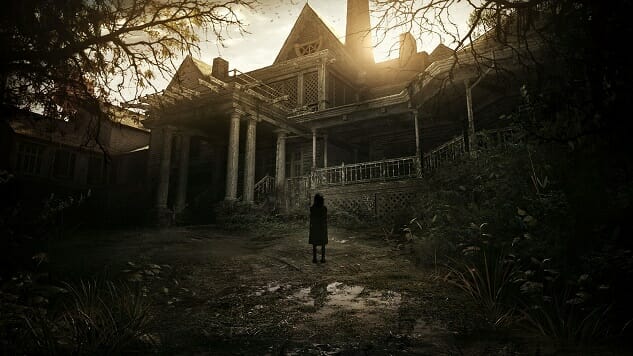
Note: This piece is the videogame Essential in Paste Quarterly #1, which you can purchase here, along with its accompanying vinyl Paste sampler.
When the first Resident Evil game came out in 1996, it served as a timely commentary on cultural fears of genetic engineering. Capcom Japan’s cardboard-like portrayal of a zombie-ridden mansion on the outskirts of a Middle American industrial town managed to strike a chord with Westerners—perhaps because we were just as afraid of Big Pharma as the heroes of the game. The monsters of the original Resident Evil games weren’t the zombies, but rather, the rich and hubristic scientists who made them.
Today, though, our fears have changed. The Walking Dead has just concluded its seventh season, during which the Trump campaign aired ads designed to stir up fears of immigrants. The zombie threat has come to mean “outsiders.” The fear of the Other. The zombies have become the villain—not the shadowy, unnoticed corporations.
The same is true in Resident Evil 7, surprisingly, but the game still manages to flip that script in other ways. Our new setting doesn’t take on the action-packed global scale of latter-day Resident Evil games, but instead, takes us to a seemingly abandoned, remote plantation in the fictional town of Dulvey, La. It’s haunted, or so the locals claim, so naturally, the hosts of a reality TV show about paranormal events set out to investigate. These slick TV hucksters aren’t the villains of our story, although they are the brats who we’re happy to see die during the game’s prologue. The true villains are the occupants of the boarded-up building: the Baker family, who after years of living happily together, have somehow transformed into terrifying monsters. What is the source of their disease? There must be something about this old plantation that has infected their minds.
Unlike prior Resident Evil games, the protagonist is not a government operative, nor particularly gifted in combat skills. He’s just a white American civilian guy, whose equally milquetoast wife got kidnapped by the Bakers and then transformed into some sort of murderous, apparition-like shadow of her former self. The Bakers’ ominous catch-phrase, “welcome to the family,” underscores the fact that anyone who stays in the house too long will lose their humanity and join the monsters. And so too will our nondescript hero … if he’s not careful.
This is not an action game. The player spends the bulk of their time watching, waiting, listening, looking around, and noticing patterns. One must be stealthy in order to avoid one’s captors, and since the player character isn’t a special operations expert, he can’t rely on physical strength or calling in reserves or government helicopters to fly to his rescue. At the game’s disgusting, oozing center lies the family dinner: the Bakers gather around a table together, feasting upon oily innards and slabs of flesh. They encourage you to join them. Don’t you want to be polite?
Back in 1996, exploring the lavish Spencer Estate reminded the player of the out-of-touch attitudes of the villains who funded the Umbrella Corporation. Now, in 2017, we explore a once-lavish but now downtrodden plantation, overridden with a monstrous family that believes you should be honored to become a monster, too. And, of course, the slimy reality TV stars that can’t resist but to gawk upon (and profit from) the Baker family’s sorry state.
It’s almost too on the nose, really. Did Capcom know what horrors we would all face, this coming year? Because, now, more than ever, we feel the pressure to escape this horrifying house—to tear the boards from the windows and let the sunlight stream in, and to show the world the horrors hiding inside. We don’t have government-funded special forces to help us; their funding probably got cut, years ago. We’re just going to have to escape this plantation on our own … and, on our way out the door, burn it all to the ground. Salt the earth, and never look back.
Maddy Myers covers esports for Kotaku and Deadspin. She was formerly the assistant editor of Paste’s games section and an editor with The Mary Sue.